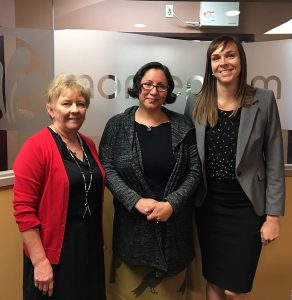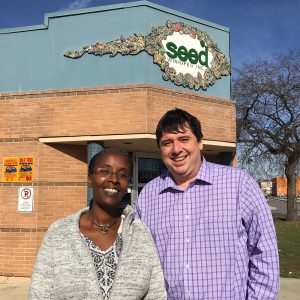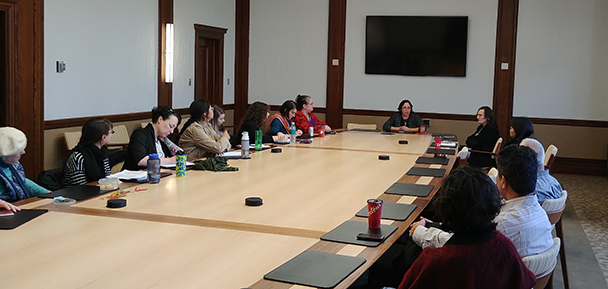by Carmen Daniels & Aaron Davis
Chasing buffalo and financial empowerment in the Canadian prairies became the theme of our recent fact-finding hunt. In his photographic quest to ‘get the shot’, ICAN’s CEO Aaron ‘Bushman’ Davis was almost charged by a buffalo, on one of our many visits to Elk Island National Park (Alberta). In much safer environments, Aaron and I met with community economic development organisations to learn more about Canadian approaches to ‘financial empowerment’, the term used in Canada for how we in Australia, describe our work in financial capability.
Our visit to Calgary, Alberta and Winnipeg, Manitoba in mid-October was inspired by Professor Jerry Buckland’s visit to Australia back in November 2016, when he visited Cairns and Melbourne to encourage more interaction between Australian and Canadian work in financial inclusion. In October, Professor Buckland of Menno Simons College (University of Winnipeg), organised an exchange for ICAN and two community economic development organisations Momentum, located in Calgary, Alberta and SEED (Winnipeg), located in Winnipeg, Manitoba.
Our visits with Momentum and SEED highlighted how each organisation aligns their financial empowerment education programs with the broader mandate of community economic development. “Community Economic Development (CED) recognises the interconnectedness of our social, environmental, and economic well-being,” explained Courtney Mo, Momentum’s Manager of Public Policy. When I arrived at Momentum, the centre was a buzz of activity and I was impressed by its relaxed, drop-in nature. Participants were busy at computers developing resumes and a full class of trades training was underway. “Momentum uses a CED approach in its work with program participants, collaborations with community partners, and when working with government on policy development,” Courtney said.
Professor Buckland provided the background for how CED was established as a movement in Canada. “The CED focus in Canada is rooted in an initiative that gained momentum during Paul Martin’s short tenure as PM in the early 2000s,” he said. “Its roots can be found in regional efforts at development in poorer or more isolated/insulated parts of the country including the Atlantic Provinces, Quebec, and the Prairies,” he explained. “This explains the importance of credit unions, which are a reflection of these community-regional initiatives.”
We were impressed by each organisation’s approach to ‘Asset-building’ and how the sustainable livelihoods model is embedded into Momentum and SEED programs. “This model is based on the notion that in order for a person to build a sustainable livelihood and stay resilient, they need to build strength in five different asset areas,” Courtney explained. “Those areas are personal, physical, social, human and financial.” Louise Simbandumwe, CEO of SEED Winnipeg, expanded on the model. “The Sustainable Livelihoods framework was developed by the Department for International Development in the UK and was adapted for use in Canada by Eko Nomos.” Professor Buckland adds that the asset-building emphasis was also of interest to policymakers in Canada. “In the mid 2000s, Sherraden’s asset-building focus was embraced by government and many community economic development organisations.”

L to R: Brenda Purschke, Momentum Financial Literacy Co-ordinator, Carmen Daniels ICAN Research & Communications & Courtney Mo, Momentum Manager of Public Policy
We drew parallels between the sustainable livelihood framework utilised by SEED and Momentum, and our own Yarnin’ Money program here at home. Yarnin’ Money utilises a narrative approach to assist people to develop financial literacy skills through a culture-centred training model, which recognises existing cultural worldviews and knowledge as the foundation to build new skills. While we take a strengths-based approach to delivering financial capability training, there is much we can learn from the sustainable livelihoods framework, which centres upon a holistic approach to building both tangible and intangible assets.
We shared with SEED and Momentum how ICAN incorporates consumer advocacy work, as a key focus of our financial capability and financial counselling work. “ICAN’s work on consumer protection is impressive,” said Courtney. “Momentum was really pleased to learn of another organization looking holistically at an individual’s and whole community’s economic resilience,” she said. “What was exciting about ICAN was learning about the major efforts and investments and looking at root causes, the systemic barriers, to economic resilience,” Courtney explained.
We too, were impressed to learn about Momentum’s work in consumer protection, and heard how they are actively working with the Provincial Government towards new consumer protection regulation. We heard about the recent payday lending reform in the province of Alberta, including important changes made towards lowering the allowable cost of borrowing, enabling instalment payments and restricting rules on marketing. “It’s a positive step toward reducing predatory lending in Alberta”, Courtney said. “However, payday lending is only one form of high-cost credit. We must ensure that there are sweeping changes and improvements to high-cost lending in general – for any of the products on the market today and ones that may be invented in the future,” she noted.
We concluded our tour by speaking to staff and students of Menno Simons College (University of Winnipeg), International Development program, and the Faculty of Native Studies at the University of Manitoba. “Audiences were very interested in your comments and it was clear that people were comparing the situation in Australia and Canada,” Professor Buckland noted. “It was so useful to hear about the situation for Indigenous peoples in Australia, and realize the similarities and differences for Indigenous peoples in Canada.”
We thank Professor Jerry Buckland & the Menno Simons team including Professor Kirit Patal; Courtney Mo and the Momentum team: Brenda Purschke, Anna Cameron & Carlen Scheyk; Louise Simbandumwe and the SEED Winnipeg team; Associate Professor Niigaanwewidam James Sinclair (University of Manitoba), Professor Peter Kulchyski (University of Manitoba) & Associate Professor Cary Miller – Head of Native Studies (University of Manitoba), for their hospitality and kindness. Hiy Hiy!
Oh…and in the end… Aaron did get the shot!


